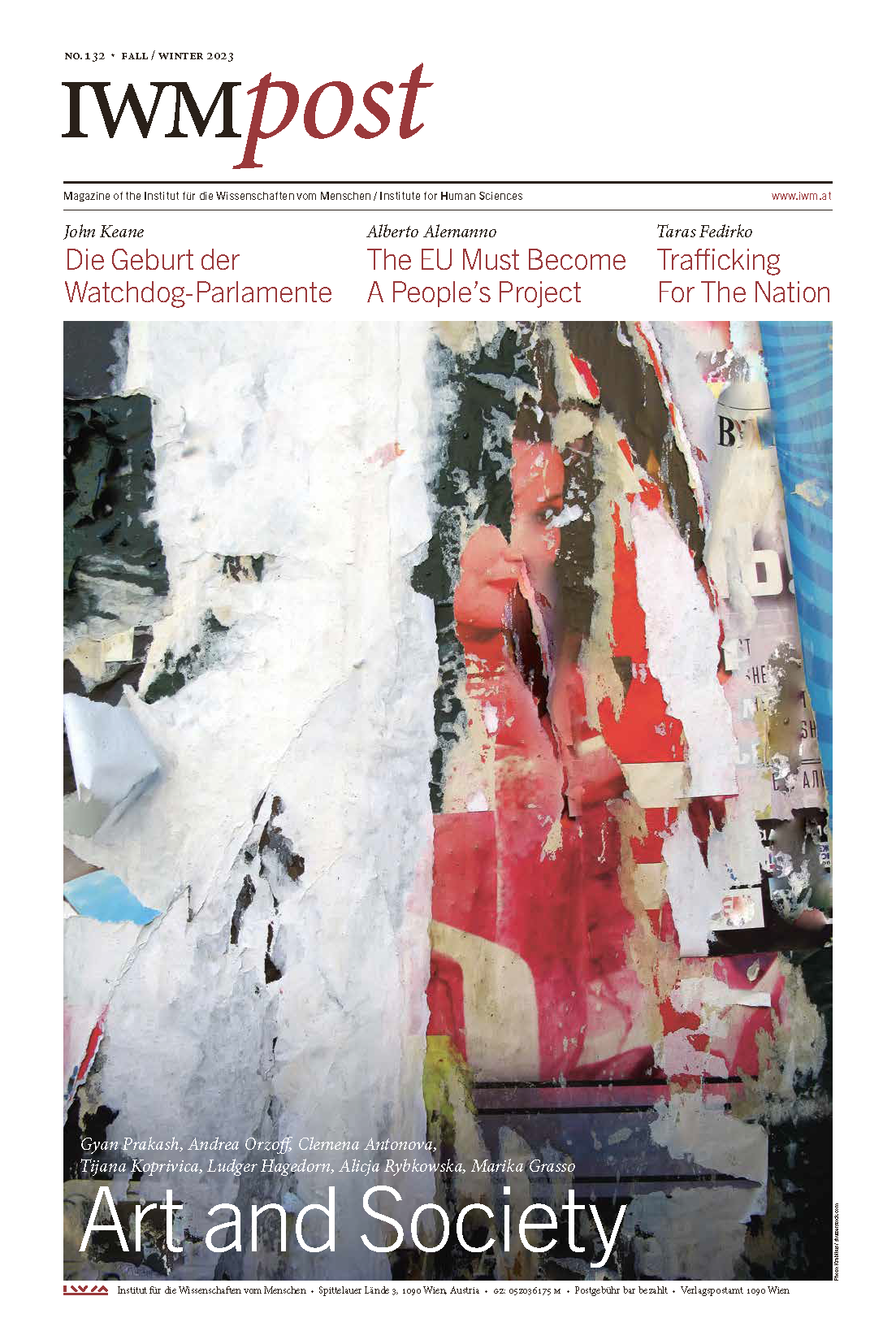In line with the profile of the IWM and the IWMpost, this issue covers a wide range of topics. For the first time, however, the largest section of an IWMpost issue consists of essays that center on art and literature, and that use them as entry points to reflect on social issues. The essays that form this section address the political implications of pioneering work by artists (Prakash, Orzoff, Antonova), discuss the interplay between art and politics (Antonova, Koprivica), focus on literary ways of mirroring and documenting reality (Hagedorn, Rybkowska), and problematize the encounter between art and science (Grasso).
No IWMpost issue is complete without essays that address issues of democracy. The respective essays in this issue focus on experiments and tools of democratic renewal: watchdog parliaments (Keane), citizens’ assemblies (Cesnulaityte), EU reform (Alemanno), and WhatsApp groups (Barbosa). The contributions on populism (Samaddar, Wyss) and feminist politics (Haastrup, Shparaga) are also closely related to this focus on democracy. Gjuričova in turn discusses in her essay why political history is worth rescuing.
In a section on the war in Ukraine, Dovzhyk criticizes the epistemic injustice of Western reporting while Fedirko addresses the rise and transformation of the informal war economy. Two further essays deal with issues of migration and human trafficking. While Ramsauer and Çağlar discuss the heuristic challenge that the religious conversion of asylum seekers poses to the authorities, Banerjee strives for a balanced picture of trafficked women.
Finally, Ludger Hagedorn honors the memory of Karel Schwarzenberg, a long-time friend and supporter of the IWM, who sadly passed away last November.
I hope you enjoy the read!
Evangelos Karagiannis
Download IWMpost 132 as a PDF
Content
Democracy
Die Geburt der Watchdog-Parlamente / von John Keane
Democratic Innovation: A Matter of National Security / by Ieva Cesnulaityte
To Survive, the EU Must Become a People’s Project / by Alberto Alemanno
WhatsAppers and Local Participation in Brazil / by Sérgio Barbosa
History
Political History Is Worth Saving / by Adéla Gjuričová
Populism
Unpacking the Power of Memory in Populism / by Johana Wyss
Populism and Rewriting the Grammar of Democracy / by Ranabir Samaddar
Feminism
Feminist Foreign Policy: A Dangerous Proposition for the European Union? / by Toni Haastrup
Feministische Politik und Fürsorge / von Olga Shparaga
War in Ukraine
Mediating Ukraine / by Sasha Dovzhyk
Trafficking for the Nation / by Taras Fedirko
Migration
Den Glauben glaubhaft machen / von Markus Elias Ramsauer und Ayşe Çağlar
Human Trafficking
Human Trafficking, Gender, and Agency / by Paula Banerjee
Art and Society
Culture After Empire / by Gyan Prakash
The Jewish Express and the Bolivian Cantata / by Andrea Orzoff
The Victory of the Literal / by Clemena Antonova
Lost in Canonization: Intermediality of Yugoslav Avant-Garde Illustrated Poetry Books / by Tijana Koprivica
Die Intellektuellen und ihre Verführbarkeit / von Ludger Hagedorn
Despicable Matter: Deborah Vogel’s Cubist Prose / by Alicja Rybkowska
Between Neuroscience and the Arts: Where Is the Body? / by Marika Grasso
Karel Schwarzenberg
Demokrat, überzeugter Europäer und Freund des IWM / von Ludger Hagedorn
